Module 3 Heroes Unit 2There were few doctors, so he had to work very hard on his own课件(32张PPT)
文档属性
| 名称 | Module 3 Heroes Unit 2There were few doctors, so he had to work very hard on his own课件(32张PPT) | 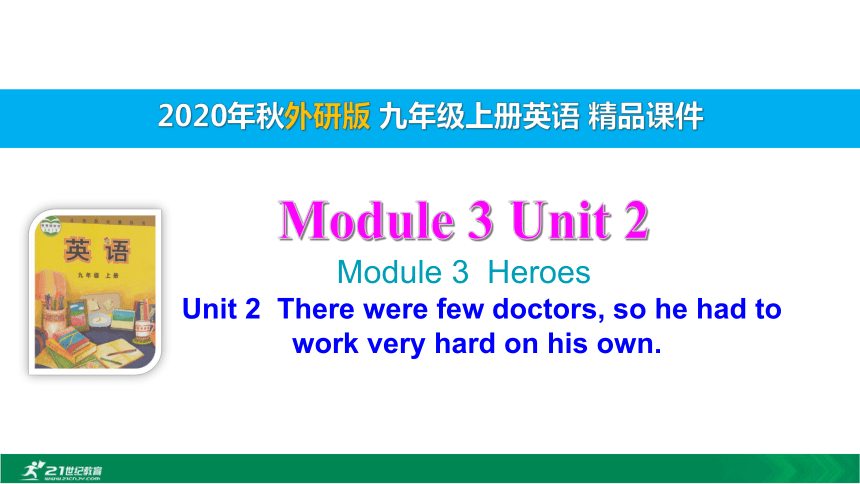 | |
| 格式 | pptx | ||
| 文件大小 | 3.4MB | ||
| 资源类型 | 试卷 | ||
| 版本资源 | 外研版 | ||
| 科目 | 英语 | ||
| 更新时间 | 2020-08-12 10:13:18 | ||
图片预览

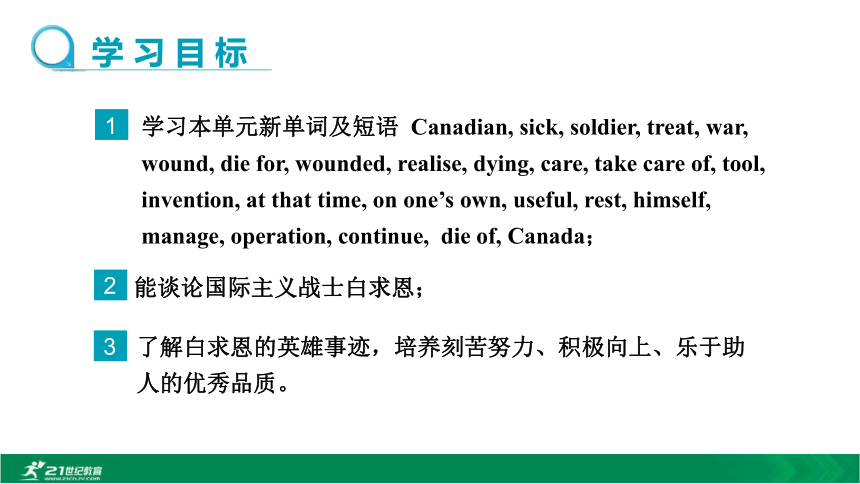
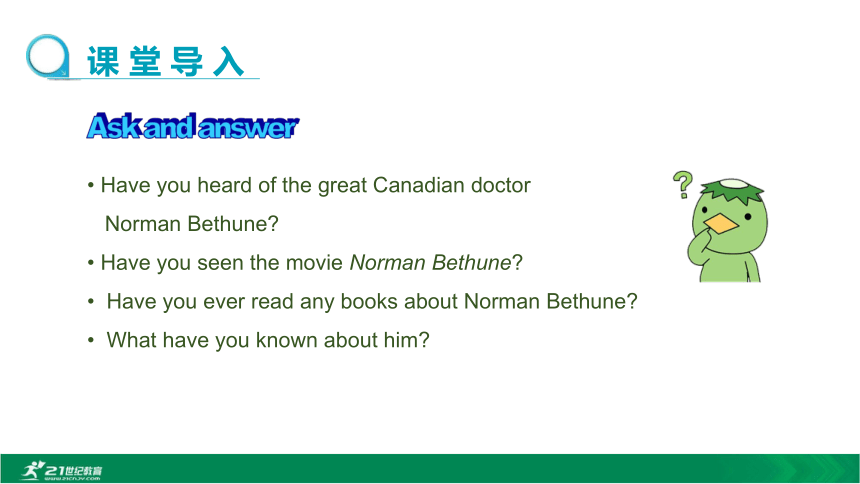



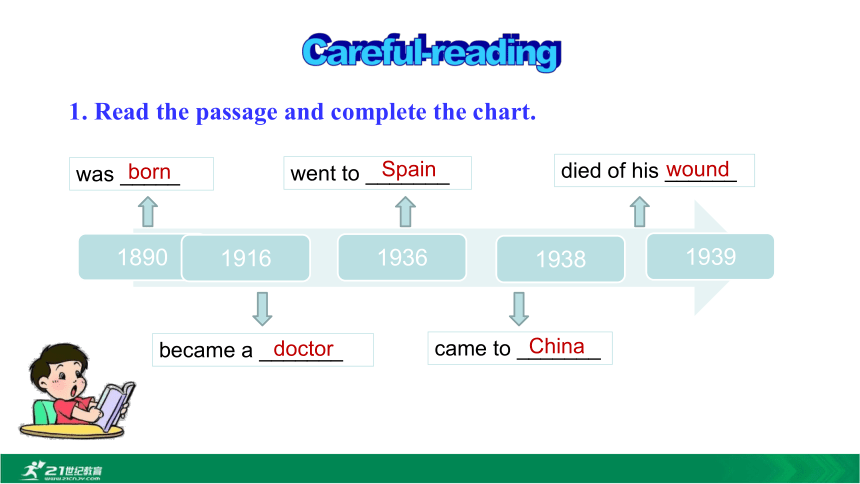
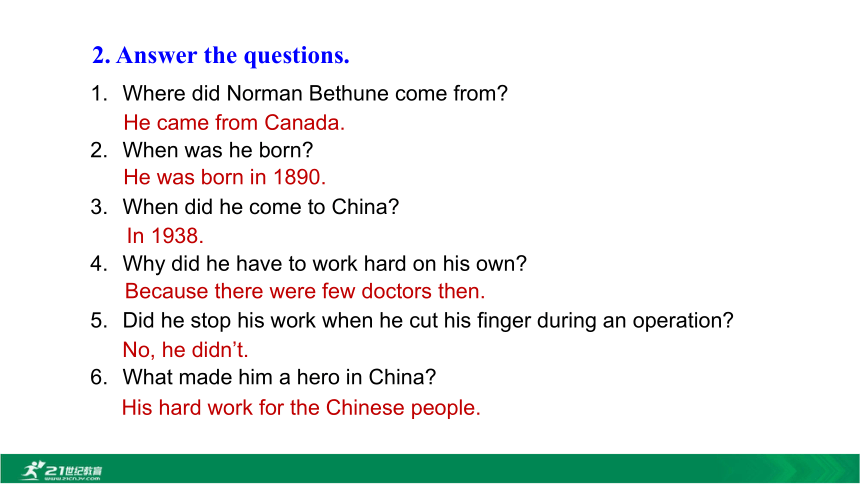
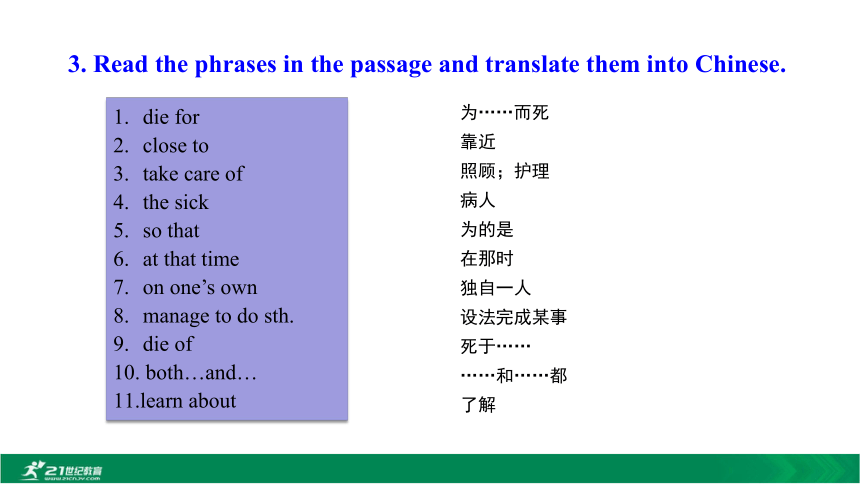

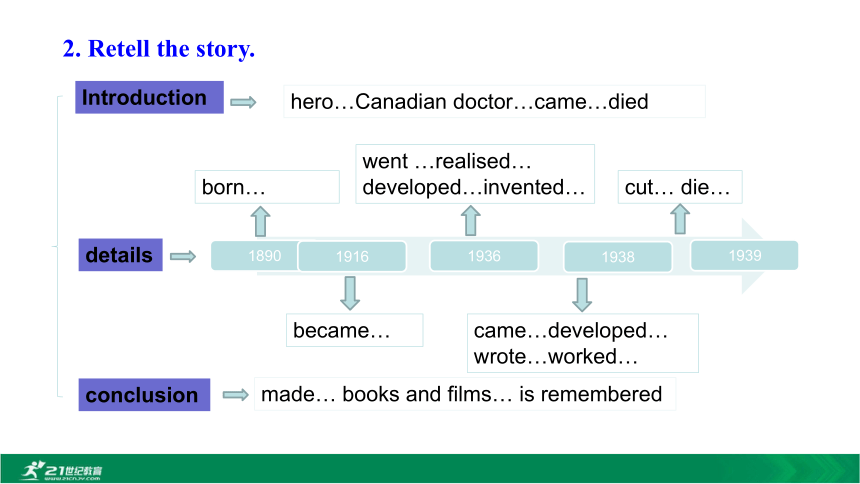
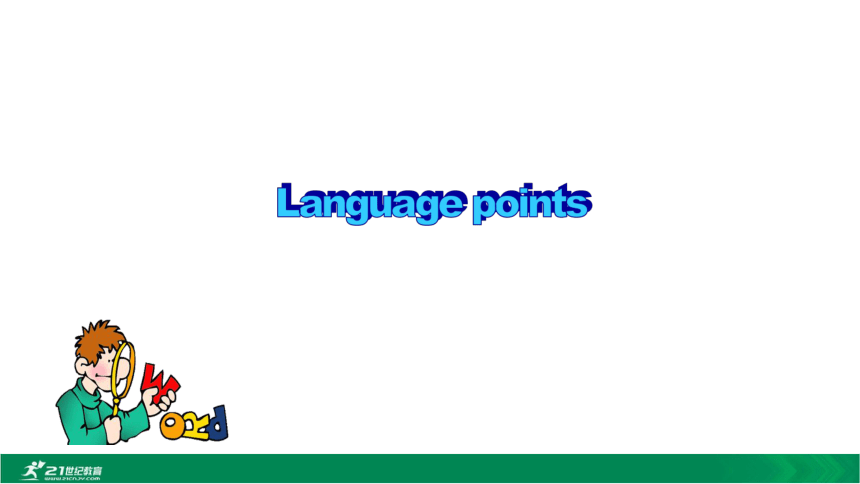
文档简介
2020年秋外研版 九年级上册英语 精品课件
Module 3 Unit 2
Module 3 Heroes
Unit 2 There were few doctors, so he had to
work very hard on his own.
学 习 目 标
学习本单元新单词及短语 Canadian, sick, soldier, treat, war, wound, die for, wounded, realise, dying, care, take care of, tool, invention, at that time, on one’s own, useful, rest, himself, manage, operation, continue, die of, Canada;
1
3
了解白求恩的英雄事迹,培养刻苦努力、积极向上、乐于助人的优秀品质。
能谈论国际主义战士白求恩;
2
课 堂 导 入
Ask and answer
? Have you heard of the great Canadian doctor
Norman Bethune?
? Have you seen the movie Norman Bethune?
? Have you ever read any books about Norman Bethune?
? What have you known about him?
Norman Bethune was a Canadian doctor. He came to China to help the Chinese people. He was good at doing operations and saved many wounded soldiers during the Anti-Japanese War. He worked hard. He died for the Chinese people.
Discuss and make up a conversation.
Canadian doctor hospital sick
soldier treat war wound
Read the text quickly, and number the events about Norman Bethune in the order they happened.
a) came to China
b) wrote books about ways of treating the sick in China
c) was born in 1890
d) invented medical tools to use outside hospitals
e) died
f) went to treat the wounded soldiers in Spain
Fast-reading
课 堂 学 习
1
2
3
4
5
6
was _____
born
1. Read the passage and complete the chart.
became a _______
went to _______
came to _______
died of his ______
doctor
Spain
China
wound
Careful-reading
2. Answer the questions.
Where did Norman Bethune come from?
When was he born?
When did he come to China?
Why did he have to work hard on his own?
Did he stop his work when he cut his finger during an operation?
What made him a hero in China?
He came from Canada.
He was born in 1890.
In 1938.
Because there were few doctors then.
No, he didn’t.
His hard work for the Chinese people.
3. Read the phrases in the passage and translate them into Chinese.
为……而死
靠近
照顾;护理
病人
die for
close to
take care of
the sick
so that
at that time
on one’s own
manage to do sth.
die of
both…and…
learn about
为的是
在那时
独自一人
设法完成某事
死于……
……和……都
了解
1. Complete the passage with the correct form of the words in the box.
Canadian continue himself invention manage sick tool war wound
Norman Bethune was (1)_________,but he is one of the most famous heroes in China. During the (2)________ in Spain,he treated the wounded soldiers there. He invented special (3)________ to use outside hospitals. His (4)___________ saved many lives. In China,he (5)__________ to treat (6)______ and wounded soldiers. He often worked without taking a rest and did not look after (7)________.At one point,he (8)__________ to save over one hundred lives in sixty-?nine hours. During an operation,he cut his finger,and finally died of his (9)________.He is still remembered in both China and Canada.
Canadian
war
tools
inventions
continued
sick
himself
managed
wound
Post-reading
born…
became…
went …realised…
developed…invented…
came…developed… wrote…worked…
cut… die…
2. Retell the story.
Introduction
hero…Canadian doctor…came…died
details
conclusion
made… books and films… is remembered
Language points
He came to China to help the Chinese people and died for them.
他来到中国帮助中国人民,并为他们献身。
die不及物动词,意为“死”,过去式和过去分词都是died,现在分词是dying。
die for意为“为……而死”。
His grandfather died 20 years ago. 他爷爷是20年前去世的。
Thousands of pioneers died for our country.
无数的先烈们为我们的祖国而献身。
【注意】
die是终止性动词,不能直接与表示一段时间的状语连用。与一段时间连用时
常用be dead来代替。
Her father has been dead for 3 year. 她父亲去世3年了。
【辨析】die, dead, dying与death
The famous scientist died at the age of 97.
这位著名的科学家在97岁时去世了。
The cat was dead. 那只猫死了。
It was a dying bird. 那是一只即将死去的鸟。
Her death made us all sad. 她的去世使我们都很伤心。
{5940675A-B579-460E-94D1-54222C63F5DA}die
动词
死;去世
常作谓语
dead
形容词
死的;去世的
常作表语或定语
dying
形容词
垂死的;即将死亡的
只在名词前作定语
death
名词
死亡
常作主语或宾语
2. He soon realised that many people were dying because they did not get to
hospital quickly enough.
他很快意识到很多人因为不能及时入院治疗而生命垂危。
realise 及物动词,意为“了解;意识到”,后接名词、代词或从句。
I didn’t realise my mistake until Miss Go told me.
直到高老师告诉我,我才意识我的错误。
We realised how important it was to learn English well.
我们意识到学好英语是多么重要啊。
【拓展】 realise作及物动词,还可表示“实现;完成”。
I will realise my dream some day. 终有一天我会实现我的梦想。
3. Doctor Bethune developed new ways of taking care of the sick.
白求恩医生研究出了护理病人的新方法。
(1) take care of意为“照顾;护理”,相当于look after。take good care of
相当于look after…well,意为“好好照顾”。
If you use your father’s camera, you must take good care of it.
= If you use your father’s camera, you must look after it well.
如果你用你父亲的照相机,你一定要好好护理它。
(2)the sick意为“病人” 。
在英语中,“the+某些形容词”表示一类人,表示复数含义。作主语时,
谓语动词用复数。
the young 年轻人 the old 老年人
the rich 富有的人 the poor 穷人
the wounded 伤员
The young love this game. 年轻人喜欢这个游戏。
4. At that time, there were few doctors, so he had to work very hard on his own. 那时医生很少,所以他不得不很辛苦地独自工作。
(1) few意为“很少;几个”,表示否定的含义。
He had few friends in the city, did he?
他在这座城市里没有几个朋友,对吗?
【辨析】few, a few, little, a little
few a few
little a little
修饰可数名词复数
修饰不可数名词
表示否定含义
表示肯定含义
(2) on one’s own 意为“独自一人”,常在句中作状语。
Can you finish the work on your own?
你能独自完成这项工作吗?
They can live on their own now.
他们现在能自食其力了。
【拓展】
of one’s own意为“(属于某人)自己的”,常用于名词之后作定语。
I have a computer of my own. 我有一台属于我自己的电脑。
5. Once, he even worked for sixty-nine hours without stopping and
managed to save over a hundred lives.一次,他甚至连续工作了69个小时,
成功救治了一百多个生命。
【辨析】manage to do sth. 与try to do sth.
We managed to cross the river and reached the other side.
我们设法渡过河到达了对岸。
I tried to finish my homework before 10 am, but I didn’t.
我尽力在上午10点前完成我的作业,但没有做到。
{5940675A-B579-460E-94D1-54222C63F5DA}manage to do sth.
设法做成某事
强调成功完成这一结果
try to do sth.
尽力做某事
强调过程,不一定成功
6. …but he continued his work without treating it.
……但他没有处理伤口,仍继续工作。
continue 动词,意为“(使)继续”,常见用法有:
名词/代词 继续进行某事
to do sth. 继续做某事
doing sth. 继续做某事
with sth. 继续进行某事
continue
7. In the end, he died of his wound. 最后,他因伤去世。
die of 意为“因……而死”,原因多来自内部,如 hunger, cold, illness,
old age, a fever等。
The man died of illness. 这个男子死于疾病。
【拓展】
die from也可表示“死于”,多指由于外部原因而引起死亡。
Her son died from a terrible road accident two years ago.
两年前她的儿子死于一场恶性交通事故。
Writing
1. Look at the facts about Yuan Longping and write a passage about
him. Use the passage in Activity 2 to help you.
Fact Box: Yuan Longping
Now ——Is helping many countries of the world grow more rice than before
2004 ——Won World Food Prize
1980s ——Travelled around the world and gave advice about growing rice
1974 ——Developed a new kind of rice
1964 ——Made a special study of rice
1950-1953 ——Studied in Southwest Agricultural College
1930 ——Was born in Beijing
Write when and where he was born.
Write about his studies.
Write about the result of his work.
Write about the things he did and the prize he won.
Write about what he is doing now.
2. Now speak out and write.
A possible answer:
Yuan Longping was born in 1930 in Beijing. When he was 20 years old, he studied in Southwest Agricultural College. He finished his studies three years later and became a teacher.
In 1964, Yuan Longping made a special study of rice after natural disasters caused a great damage to China’s rice harvest. He wanted to find a new and strong kind of rice. He developed his new kind of rice in 1974.
In the 1980s, he travelled around the world and gave advice about growing rice to many people. In 2004, he won the World Food Prize for his contribution. Yuan Longping’s new rice has helped many countries of the world grow more rice than before. So he is called “The Father of Hybrid Rice”. He has saved many people from hunger, and that is why he is a hero.
I.单项填空
1. The mother managed ______ for work without ______ her baby know.
A. leaving; letting B. to leave; to let
C. leaving; letting D. to leave; letting
2. — His father ______ a serious illness.
— Really? I’m sorry to hear that.
A. died of B. worried about C. searched for D. looked after
3. There are ______ eggs in the fridge, so we must go to buy some for dinner.
A. some B. few C. little D. a few
4. To give ______ some peace, Mr Smith went for a walk in the country on ______ own.
A. him; his B. himself; his C. him; him D. himself; he’s
D
A
B
B
课 堂 达 标
1. Finally he decided to ________(继续)with his study for another two
years.
2. I suddenly r________ I was wearing someone else’s coat when I saw mine
on the sofa.
3. At that time, the doctors ______________ (治疗)the sick boy.
4. The parents looked worried because the doctors were doing an o________
on their daughter’s leg.
5. We need to buy some garden ______(工具)to plant flowers.
II. 根据句意及首字母或汉语提示完成单词
continue
ealised
were treating
peration
tools
1. 越来越多的动物将死于饥饿和疾病。
______ ______ ______ animals will ________ ______ hunger and illness.
2. 那时候,大多数人不能上学校。
______ ______ ______ , most people couldn’t go to school.
3. 你能照顾好你自己吗?
Are you able to _______ ______ ______ ______ yourself?
4. 他足够优秀能独立完成这台手术。
He is excellent _________ to complete the operation ______ ______ ______.
5. 我们将提前二十分钟到达体育场,为的是有时间热身。
We’ll arrived at the playground 20 minutes earlier ______ ______ we can
have time to warm up.
III.根据汉语意思完成句子(每空一词)
More and more die of
take good care of
At that time
enough on his own
so that
1. Read the passage.
2. Talk with your partner about some heroes. Search for some information on the Internet if necessary.
Homework
谢谢
21世纪教育网(www.21cnjy.com) 中小学教育资源网站
有大把高质量资料?一线教师?一线教研员?
欢迎加入21世纪教育网教师合作团队!!月薪过万不是梦!!
详情请看:
https://www.21cnjy.com/help/help_extract.php
Module 3 Unit 2
Module 3 Heroes
Unit 2 There were few doctors, so he had to
work very hard on his own.
学 习 目 标
学习本单元新单词及短语 Canadian, sick, soldier, treat, war, wound, die for, wounded, realise, dying, care, take care of, tool, invention, at that time, on one’s own, useful, rest, himself, manage, operation, continue, die of, Canada;
1
3
了解白求恩的英雄事迹,培养刻苦努力、积极向上、乐于助人的优秀品质。
能谈论国际主义战士白求恩;
2
课 堂 导 入
Ask and answer
? Have you heard of the great Canadian doctor
Norman Bethune?
? Have you seen the movie Norman Bethune?
? Have you ever read any books about Norman Bethune?
? What have you known about him?
Norman Bethune was a Canadian doctor. He came to China to help the Chinese people. He was good at doing operations and saved many wounded soldiers during the Anti-Japanese War. He worked hard. He died for the Chinese people.
Discuss and make up a conversation.
Canadian doctor hospital sick
soldier treat war wound
Read the text quickly, and number the events about Norman Bethune in the order they happened.
a) came to China
b) wrote books about ways of treating the sick in China
c) was born in 1890
d) invented medical tools to use outside hospitals
e) died
f) went to treat the wounded soldiers in Spain
Fast-reading
课 堂 学 习
1
2
3
4
5
6
was _____
born
1. Read the passage and complete the chart.
became a _______
went to _______
came to _______
died of his ______
doctor
Spain
China
wound
Careful-reading
2. Answer the questions.
Where did Norman Bethune come from?
When was he born?
When did he come to China?
Why did he have to work hard on his own?
Did he stop his work when he cut his finger during an operation?
What made him a hero in China?
He came from Canada.
He was born in 1890.
In 1938.
Because there were few doctors then.
No, he didn’t.
His hard work for the Chinese people.
3. Read the phrases in the passage and translate them into Chinese.
为……而死
靠近
照顾;护理
病人
die for
close to
take care of
the sick
so that
at that time
on one’s own
manage to do sth.
die of
both…and…
learn about
为的是
在那时
独自一人
设法完成某事
死于……
……和……都
了解
1. Complete the passage with the correct form of the words in the box.
Canadian continue himself invention manage sick tool war wound
Norman Bethune was (1)_________,but he is one of the most famous heroes in China. During the (2)________ in Spain,he treated the wounded soldiers there. He invented special (3)________ to use outside hospitals. His (4)___________ saved many lives. In China,he (5)__________ to treat (6)______ and wounded soldiers. He often worked without taking a rest and did not look after (7)________.At one point,he (8)__________ to save over one hundred lives in sixty-?nine hours. During an operation,he cut his finger,and finally died of his (9)________.He is still remembered in both China and Canada.
Canadian
war
tools
inventions
continued
sick
himself
managed
wound
Post-reading
born…
became…
went …realised…
developed…invented…
came…developed… wrote…worked…
cut… die…
2. Retell the story.
Introduction
hero…Canadian doctor…came…died
details
conclusion
made… books and films… is remembered
Language points
He came to China to help the Chinese people and died for them.
他来到中国帮助中国人民,并为他们献身。
die不及物动词,意为“死”,过去式和过去分词都是died,现在分词是dying。
die for意为“为……而死”。
His grandfather died 20 years ago. 他爷爷是20年前去世的。
Thousands of pioneers died for our country.
无数的先烈们为我们的祖国而献身。
【注意】
die是终止性动词,不能直接与表示一段时间的状语连用。与一段时间连用时
常用be dead来代替。
Her father has been dead for 3 year. 她父亲去世3年了。
【辨析】die, dead, dying与death
The famous scientist died at the age of 97.
这位著名的科学家在97岁时去世了。
The cat was dead. 那只猫死了。
It was a dying bird. 那是一只即将死去的鸟。
Her death made us all sad. 她的去世使我们都很伤心。
{5940675A-B579-460E-94D1-54222C63F5DA}die
动词
死;去世
常作谓语
dead
形容词
死的;去世的
常作表语或定语
dying
形容词
垂死的;即将死亡的
只在名词前作定语
death
名词
死亡
常作主语或宾语
2. He soon realised that many people were dying because they did not get to
hospital quickly enough.
他很快意识到很多人因为不能及时入院治疗而生命垂危。
realise 及物动词,意为“了解;意识到”,后接名词、代词或从句。
I didn’t realise my mistake until Miss Go told me.
直到高老师告诉我,我才意识我的错误。
We realised how important it was to learn English well.
我们意识到学好英语是多么重要啊。
【拓展】 realise作及物动词,还可表示“实现;完成”。
I will realise my dream some day. 终有一天我会实现我的梦想。
3. Doctor Bethune developed new ways of taking care of the sick.
白求恩医生研究出了护理病人的新方法。
(1) take care of意为“照顾;护理”,相当于look after。take good care of
相当于look after…well,意为“好好照顾”。
If you use your father’s camera, you must take good care of it.
= If you use your father’s camera, you must look after it well.
如果你用你父亲的照相机,你一定要好好护理它。
(2)the sick意为“病人” 。
在英语中,“the+某些形容词”表示一类人,表示复数含义。作主语时,
谓语动词用复数。
the young 年轻人 the old 老年人
the rich 富有的人 the poor 穷人
the wounded 伤员
The young love this game. 年轻人喜欢这个游戏。
4. At that time, there were few doctors, so he had to work very hard on his own. 那时医生很少,所以他不得不很辛苦地独自工作。
(1) few意为“很少;几个”,表示否定的含义。
He had few friends in the city, did he?
他在这座城市里没有几个朋友,对吗?
【辨析】few, a few, little, a little
few a few
little a little
修饰可数名词复数
修饰不可数名词
表示否定含义
表示肯定含义
(2) on one’s own 意为“独自一人”,常在句中作状语。
Can you finish the work on your own?
你能独自完成这项工作吗?
They can live on their own now.
他们现在能自食其力了。
【拓展】
of one’s own意为“(属于某人)自己的”,常用于名词之后作定语。
I have a computer of my own. 我有一台属于我自己的电脑。
5. Once, he even worked for sixty-nine hours without stopping and
managed to save over a hundred lives.一次,他甚至连续工作了69个小时,
成功救治了一百多个生命。
【辨析】manage to do sth. 与try to do sth.
We managed to cross the river and reached the other side.
我们设法渡过河到达了对岸。
I tried to finish my homework before 10 am, but I didn’t.
我尽力在上午10点前完成我的作业,但没有做到。
{5940675A-B579-460E-94D1-54222C63F5DA}manage to do sth.
设法做成某事
强调成功完成这一结果
try to do sth.
尽力做某事
强调过程,不一定成功
6. …but he continued his work without treating it.
……但他没有处理伤口,仍继续工作。
continue 动词,意为“(使)继续”,常见用法有:
名词/代词 继续进行某事
to do sth. 继续做某事
doing sth. 继续做某事
with sth. 继续进行某事
continue
7. In the end, he died of his wound. 最后,他因伤去世。
die of 意为“因……而死”,原因多来自内部,如 hunger, cold, illness,
old age, a fever等。
The man died of illness. 这个男子死于疾病。
【拓展】
die from也可表示“死于”,多指由于外部原因而引起死亡。
Her son died from a terrible road accident two years ago.
两年前她的儿子死于一场恶性交通事故。
Writing
1. Look at the facts about Yuan Longping and write a passage about
him. Use the passage in Activity 2 to help you.
Fact Box: Yuan Longping
Now ——Is helping many countries of the world grow more rice than before
2004 ——Won World Food Prize
1980s ——Travelled around the world and gave advice about growing rice
1974 ——Developed a new kind of rice
1964 ——Made a special study of rice
1950-1953 ——Studied in Southwest Agricultural College
1930 ——Was born in Beijing
Write when and where he was born.
Write about his studies.
Write about the result of his work.
Write about the things he did and the prize he won.
Write about what he is doing now.
2. Now speak out and write.
A possible answer:
Yuan Longping was born in 1930 in Beijing. When he was 20 years old, he studied in Southwest Agricultural College. He finished his studies three years later and became a teacher.
In 1964, Yuan Longping made a special study of rice after natural disasters caused a great damage to China’s rice harvest. He wanted to find a new and strong kind of rice. He developed his new kind of rice in 1974.
In the 1980s, he travelled around the world and gave advice about growing rice to many people. In 2004, he won the World Food Prize for his contribution. Yuan Longping’s new rice has helped many countries of the world grow more rice than before. So he is called “The Father of Hybrid Rice”. He has saved many people from hunger, and that is why he is a hero.
I.单项填空
1. The mother managed ______ for work without ______ her baby know.
A. leaving; letting B. to leave; to let
C. leaving; letting D. to leave; letting
2. — His father ______ a serious illness.
— Really? I’m sorry to hear that.
A. died of B. worried about C. searched for D. looked after
3. There are ______ eggs in the fridge, so we must go to buy some for dinner.
A. some B. few C. little D. a few
4. To give ______ some peace, Mr Smith went for a walk in the country on ______ own.
A. him; his B. himself; his C. him; him D. himself; he’s
D
A
B
B
课 堂 达 标
1. Finally he decided to ________(继续)with his study for another two
years.
2. I suddenly r________ I was wearing someone else’s coat when I saw mine
on the sofa.
3. At that time, the doctors ______________ (治疗)the sick boy.
4. The parents looked worried because the doctors were doing an o________
on their daughter’s leg.
5. We need to buy some garden ______(工具)to plant flowers.
II. 根据句意及首字母或汉语提示完成单词
continue
ealised
were treating
peration
tools
1. 越来越多的动物将死于饥饿和疾病。
______ ______ ______ animals will ________ ______ hunger and illness.
2. 那时候,大多数人不能上学校。
______ ______ ______ , most people couldn’t go to school.
3. 你能照顾好你自己吗?
Are you able to _______ ______ ______ ______ yourself?
4. 他足够优秀能独立完成这台手术。
He is excellent _________ to complete the operation ______ ______ ______.
5. 我们将提前二十分钟到达体育场,为的是有时间热身。
We’ll arrived at the playground 20 minutes earlier ______ ______ we can
have time to warm up.
III.根据汉语意思完成句子(每空一词)
More and more die of
take good care of
At that time
enough on his own
so that
1. Read the passage.
2. Talk with your partner about some heroes. Search for some information on the Internet if necessary.
Homework
谢谢
21世纪教育网(www.21cnjy.com) 中小学教育资源网站
有大把高质量资料?一线教师?一线教研员?
欢迎加入21世纪教育网教师合作团队!!月薪过万不是梦!!
详情请看:
https://www.21cnjy.com/help/help_extract.php
同课章节目录
- Module 1 Wonders of the world
- Unit 1 It's more than 2,000 years old.
- Unit 2 The Grand Canyon was not just big.
- Unit 3 Language in use
- Module 2 Public holidays
- Unit 1 My family always go somewhere interesting a
- Unit 2 We have celebrated the festival since the f
- Unit 3 Language in use
- Module 3 Heroes
- Unit 1 She trained hard,so she became a great play
- Unit 2There were few doctors, so he had to work ve
- Unit 3 Language in use
- Module 4 Home alone
- Unit 1 I can look after myself, although it won’t
- Unit 2 I became so bored with their orders that I
- Unit 3 Language in use
- Module 5 Museums
- Unit 1 Don't cross that rope!
- Unit 2 If you ever go to London, make sure you vis
- Unit 3 Language in use
- Module 6 Problems
- Unit 1 If I start after dinner, I'll finish it be
- Unit 2 If you tell him the truth now, you will sho
- Unit 3 Language in use
- Revision Module A
- Module 7 Great books
- Unit 1 We're still influenced by Confucius's idea
- Unit 2 It is still read and loved.
- Unit 3 Language in use
- Module 8 Sports life
- Unit 1 Daming wasn't chosen for the team last time
- Unit 2 He was invited to competitions around the w
- Unit 3 Language in use
- Module 9 Great inventions
- Unit 1 Will computers be used more than books in t
- Unit 2 Will books be replaced by the Internet?
- Unit 3 Language in use
- Module 10 Australia
- Unit 1 I have some photos that I took in Australia
- Unit 2 The game that they like most is Australian
- Unit 3 Language in use
- Module 11 Photos
- Unit 1 He's the boy who won the photo competition
- Unit 2 The photo which we liked best was taken by
- Unit 3 Language in use
- Module 12 Save our world
- Unit 1 If everyone starts to do something, the wor
- Unit 2 Repeat these three words daily: reduce, reu
- Unit 3 Language in use
- Revision Module B
